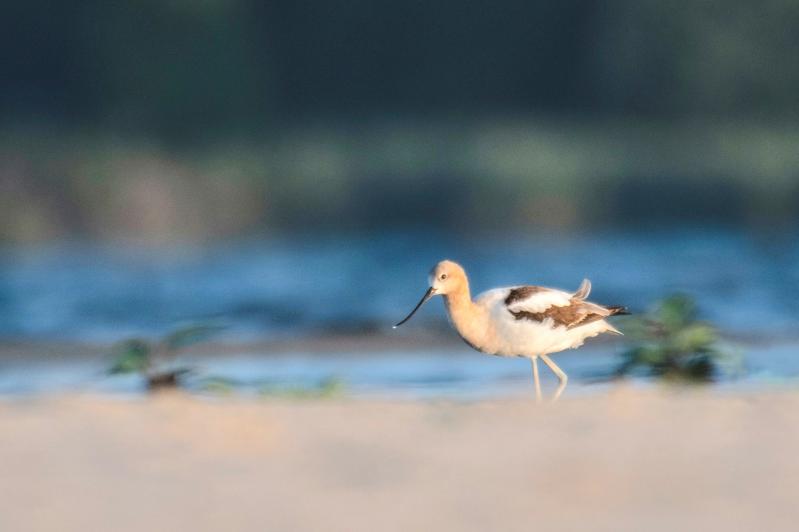The ironically named Dune Road, choked by incongruous houses, ends at W. Scott Cameron Beach in Water Mill. A large sign with a picture of a dog warns visitors “No dogs” between April 1 and Oct. 1. Perhaps instead it should read “No Rules.” Stop at the beach any early morning and off-leash dogs run amok.
One day in early August between 7:30 and 8:30 a.m., there were 15.
So, you’d be forgiven if you didn’t notice, just over the lip of the dune bordering the lot, one of the most important habitat areas for shorebirds on the entire East End: Mecox Inlet.
The inlet is well known to birders, with lists on eBird, a website which tracks bird sightings, dating back to 1959. Rare birds frequently stop here, mixing with more common species, some that pile up into the hundreds and thousands, using it as a staging ground for the next leg of their migration.
Southampton Town focuses on the federally endangered piping plover, but it is not the only bird that relies on this place.
At present, tree swallow populations are building well into the hundreds. They’ll grow further. In the first week of September in 2016, a birder counted 10,000. Common tern numbers are peaking; 800 were noted on Aug. 20. Thousands of sanderlings huddled on the flats in early August.
Some rare bird highlights from the past month (in reverse chronological order): right now, two American avocets, present since Aug. 16; on Aug. 26, an American golden plover and Western sandpipers; on Aug. 11, a red-necked phalarope; on Aug. 9, a black tern; on Aug. 8, five stilt sandpipers, and on July 30, a pomarine jaeger. A pelagic species and incredibly rare on land, the jaeger stopped on the mudflats, with a suspected injury, for five days. Hundreds of birders traveled to see it (many — ahem! — remarking on eBird that it was being consistently harassed by off-leash dogs). A complex bird, both celebrated and reviled, it was photographed multiple times gobbling down least tern chicks.
Honorable mention to four brown pelicans that landed on the sand flats one evening in July.
I’ll stop there, but suffice it to say, something about the bay meeting the ocean, and the sand flats that are created when the town trustees let the bay into the sea, attracts many species of birds.
In short, this place is important and unique and deserves more protection.
Rare birds are a type of distraction and represent an issue I have with us humans: Our shortening attention spans attach to the novel, so, I don’t like to highlight them. Well, mea culpa, I too visited Mecox to look at the avocets, which have been in residence for two weeks.
They’re graceful shorebirds that have used the inlet to refuel in recent years. Why they’re here, it’s hard to say. They are far more common in the west, where they breed before mostly wintering along the coast of Mexico down to Central America.
They have long blue-gray legs, black-and-white-striped wings that seem to rest far back on their body, a long neck, and a peach-colored head. As crazy as that sounds, the most striking feature of this bird is its habits: It runs through the shallows and sweeps its thin, upturned bill over the surface of the water in pursuit of food.
As I arrived, a woman stood looking out over the ocean. “Isn’t the light beautiful?” she asked me. And it was. However, entering the beach just behind me was a man and woman, surfers, with their dog. The dog immediately took off onto the flat, despite the man’s attempts to call it back. The avocets, separated from the invader by 50 yards of water, appeared unperturbed. Closer to the ocean another woman yelled at her dog, “Riley! Leave it! Riley! Leave it!”
I tried my attention on the birds, the good thing right in front of me, but I had so many angry voices in my head in mere minutes that my focus was lost. I spotted them, showed them to the woman who was appreciating the light, and then left.
As I was packing my car, head full of fuzz, I noticed an old-timer looking at me across the lot through his binoculars. I recognized him, a man in his 80s, and we began to talk. I told him how hard it was for me to enjoy this spot, how I just got angry all the time, and always left thinking less of people.
“Ah, I’ve been around long enough to know this place when it was really good, 50 to 60 years ago. But after a while, you just have to say, ‘What the hell?’ “ We looked at the avocets, and he told me stories of past rare birds. We failed to find the recently spotted American golden plover. “Not the right habitat for that bird. They just stop in and leave.”
They come and go, the rare birds, he said, like the common birds, the dog people, the summer people, and all the other people. He remarked that he’s outlived each of his parents by multiple years and that he felt like he was living on borrowed time. “I just hope I go on a sand flat. I look up at a beautiful bird, and that’s it.”
Another bad mood, this time just east of Mecox, at the equally important Sagaponack Pond (the old stomping grounds of Peter Matthiessen, a man who loved birds) two years ago. I was looking through my scope when a man on a bike stopped to ask what I was looking at. Forgetting to mention birds, I complained to him about the houses rising around the pond, like walls, terrible walls.
“The trick is to focus on the small slivers of beauty that remain,” he said. He was right. What else can you do? What the hell!?
In lieu of any meaningful enforcement, perhaps perspective is the only defense.

